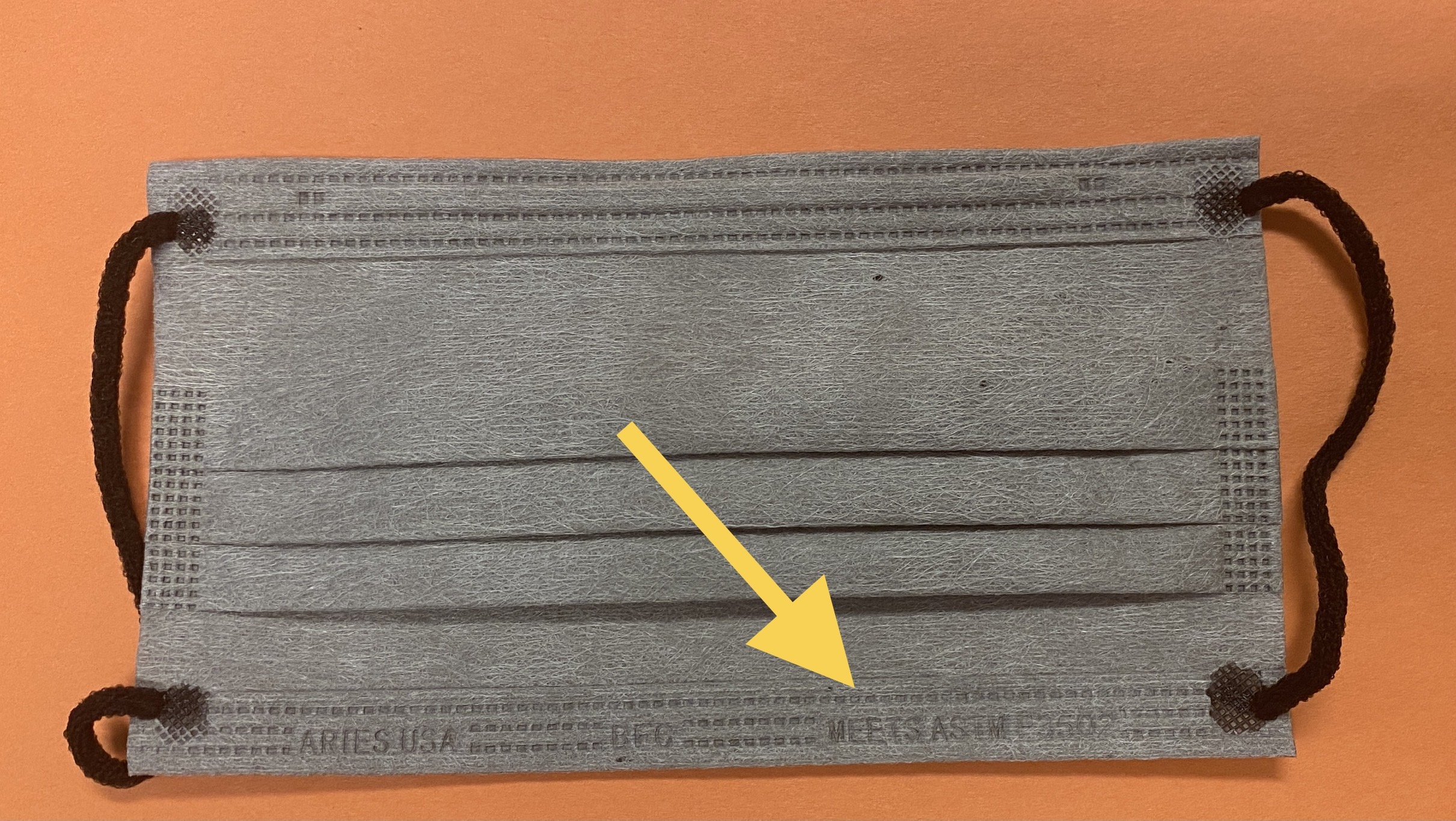Last Revised: January 10, 2022
1/10/2022 This older document does not reflect Penn's mask selection policy. See this link for guidance.
Penn-Branded cloth face coverings when worn alone are no longer recommended.
As of August 5, 2021, masks are required indoors in public and shared spaces for ALL, including those who are fully vaccinated. Public health guidance on campus continues to evolve. Visit coronavirus.upenn.edu/content/public-health-guidance for current information.
Note important revision: Because the thickness and quality of materials used in cloth face coverings can vary significantly, EHRS no longer supports the use of cloth face coverings alone, unless double-masked with a surgical mask in Campus buildings.
Please follow this guidance unless you work in a clincial environment that has requirements that supersede these recommendations.
Recommended masks:
- American Society for Testing and Materials (ASTM) F3502 labeled mass approved by EHRS: (Filter rating of 2, breathing resistance 2). Note that these masks do not require and branding. They will be label with the ASTM standard number. These are masks are more expensive than non-medical grade and medical grade masks, however these masks tend to provide the best facial fit. See important details below. Currently approved Aries 40-hour face mask. Penn purchases made with a PO (Ben Buys Number 644789) will receive a discount from the retail price. The Penn Bookstore also stocks sells these masks.
- Non-medical grade surgical-style: These masks contain a middle layer of melt-blown polypropylene to capture small particulates, are inexpensive, easy to obtain, and provide low breathing resistance. These are the only masks recommended for double-masking with a cloth face covering. Most cost-effective option
- Penn-Branded cloth face coverings when worn alone are no longer recommended. The literature supports that the performance of cloth face coverings alone may not always achieve the same level of source control as non-medical grade surgical-style, ATSM Level I, II or III procedure masks or ASTM F3501 (2,2,) masks. Penn-Branded cloth face coverings may be worn only when double masked with a disposable surgical mask.
- ATSM F3502 Level 1, 2 or 3 procedure masks: These are medical products which are now in sufficient supply for source control use.
For special circumstances:
- Transparent masks for situations where mouth visibility is required. See below for specific product recommendations.
Mask Descriptions
Non-medical grade surgical-style Masks
EHRS recommends that Penn-affiliates wear non-medical grade surgical-style as their primary mask. Surgical-style procedure masks are constructed with three layers. The two outer layers consist of non-woven fabric made of polypropylene (typically) with densities of 20 or 25 grams per square meter (gsm). The center layer consists of a melt blown polypropylene layer which filters using both mechanical and electrostatic properties. This results in a mask that is highly effective at filtration with very low breathing resistance. If gaps occur, double masking with a cotton mask or following the Maximizing the Fit recommendations will improve protection.
ASTM F2100 Level 1, 2 or 3 masks.
These are medical grade face masks. Masks filter at 95% (Level 1) or 98% (Levels 2, or 3) at 3 um.
American Society for Testing and Materials (ASTM) F3502 labeled masks.
These masks are tested and rated barrier face coverings. The standard established uniform testing criteria for respiratory droplet source control, filtration, breathability, and labeling of face coverings. This standard allows end users to directly compare the performance of different mask products.
The label “MEETS ASTM F3502” will be printed on face coverings that have been determined to meet these specifications by an accredited testing laboratory. EHRS recommends ASTM level 2 masks (level 2 for both filtration and breathing resistance) that do not contain a removable filter.
Approved: Level 2 Mask Aries 40-hour face mask. Penn purchases made with a PO (Ben Buys Number 644789) will receive a discount from the retail price. The Penn Bookstore also sells these masks.

Double Masking
Surgical masks may not form a tight seal on all faces, thus reducing the effectiveness of the mask. Concerns regarding new variants of SAR-CoV-2 that may be more transmissible has emphasized the need for improved mask protection. Double-masking, placing a cloth face covering over a surgical mask, improves the facial seal and also provides a second filtration barrier. Double-masking is encouraged for use at Penn; however, it may not be possible for everyone. Double-masking is most valuable in close-distance situations in the lab, on public transit, and off-campus, where the quality of masks and proper mask wearing may be less consistent.
Do not double-mask with two cotton face coverings, or over respirators, or masks that contain filters. This can make it difficult to breathe. The mask closest to your face must be a non-medical grade surgical-style procedure mask. The second mask, worn over a surgical-style mask, may be a Penn-branded cotton cloth face covering or any home-made or purchased face covering. See Maximizing Fit for Cloth and Medical Procedure Masks to Improve Performance and Reduce SARS-CoV-2 Transmission and Exposure
Reuse
Supplies of face masks are stable and reuse is no longer necessary to extend wear.
Transparent masks
In situations where lip reading or facial recognition is necessary, a transparent mask may be used. Please see the table below for specifics on clear masks options and choose based on the population of people who need to use them. Click on product name to go to webpage.
If you are working in a healthcare setting, choose one of the two FDA approved masks from the target group "Healthcare Facilities/Nursing".
|
Mask |
Target Group at Penn |
|
Bendshape Quartz (general purpose) |
General population |
|
Bendshape Quartz Surgical Mask (ASTM3) |
Healthcare facilities/nursing |
|
ClearMask Non-Medical Consumer Transparent Face Mask |
General population |
|
ClearMask Transparent Surgical Mask |
Healthcare facilities/nursing |
|
General population |
Face Shields
CDC does not recommend using face shields as a substitute for masks. However, when combined with a mask, a face shield protects the eyes of the person wearing it. Face shields must be used when lab work makes it impossible to maintain distancing. Choose a face shield that wraps around the sides of your face and extends below your chin or a hooded face shield. This is based on the limited available data that suggest these types of face shields are better at preventing spray of respiratory droplets. See CDC Guidance
Respirators
N95 Respirators
N95 respirators are made from the same material as non-medical grade surgical style masks but provide a closer fit than a surgical mask. The CDC does not recommend the use of N95 respirators as a face mask. CDC N95 Guidance. N95 respirators only provides the expected protection when used correctly and are fit tested.
KN-95 Respirators
KN95 respirators are filtering facepiece respirators typically made in China that have not been tested for compliance with US standards. Counterfeit KN95s are in circulation and CDC has estimated that up to 60% of KN95’s are counterfeit.
The CDC has updated guidance on the use of KN95s as a face mask (not respirator) HERE, and the requirements for the choice of KN95s as face masks HERE.
Not Permitted
One-way Exhalation Valves
One-way exhalation valves, which permit unfiltered air to be released by a mask or respirator, are not permitted.

Issued 4/7/2020
4/24/20 Revised with Surgical-style mask information
5/4/20 Revised with one-way exhalation valve information
5/26/20 Revised with private office/cubicle information
8/4/20 Revised with Penn-Provided cotton mask
8/26/20 Storage guidance removed
11/12/20 Masks may also protect you!
1/20/21 Revised Universal Mask information
2/1/21 Revised to reflect double masking
2/10/21 KN-95 performance
3/23/21 Revised to include information about ASTM standard for face coverings
5/25/21 Revised with new Philadelphia outdoor mask guidance
6/17/2021 Revised with indoor mask guidance
8/5/2021 Revised indoor mask guidance
8/20/21 Revised with CDC N95 and KN95 guidance
8/23/21 Page reorganized for clarity
9/3/21 ASTM tested mask added
9/22/21 ASTM Level 1-3 surgical masks added
9/23/21 Penn-Branded cloth face coverings downgraded.
12/1/21 Discount for Penn PO purchases of Aries mask added.
1/6/22 Ben Buys info added - cloth mask update.